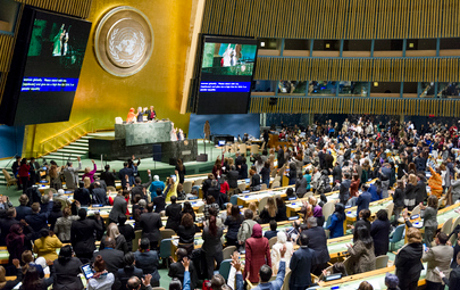
Opening of the UN Committe on the Status of Women (CSW), 2017.
Bild: United Nations Photo
The Saudi regime can’t stop the women’s rights activists
2017-05-03 | Almut Rochowanski

INTERNATIONAL
The inclusion of the Saudi regime into the UN Commission on the Status of Women will not likely have any greater consequences för the commission’s work, which is already laden down and mostly symbolic, according to Almut Rochowanski.
Almut Rochowanski is an advisor for the Women’s international league for peace and freedom (WILPF), and works with post-Soviet women on issues of global activism. She has been attending the CSW since 2008, organizing groups of women’s rights activists from the Russian North Caucasus, including Chechnya.
The Commission on the Status of Women was created 61 years ago. It is a commission under the ECOSOC, the Economic and Social Council of the UN, tasked with both guiding all the UN agencies that work on social, economic and development issues and working through direct engagement with member states on global policies.
Basically, the CSW operates like any commission or committee at the UN that is led by member states (as opposed to committees created by human rights conventions, which are made up of independent experts). The CSW does preparatory work and consultations around the year, for its two-week session in March. During that conference session, the 45 member states, drawn in roughly equal numbers from the world’s geographic regions, edit, line by line, the ”agreed conclusions”, which are the main output of the CSW.
The scope of the text is to both cover general commitments in all areas of women’s equality and rights and to focus on each year’s specific topic. This year, the topic was ”Women’s economic empowerment in the changing world of work”.
These ”agreed conclusions” are named as such because this product of the March conference is a consensus document. Any member state can veto any word or sentence in it, if they choose. But in practice, there is compromise and an attempt to formulate language that is acceptable to all. In addition, there is also diplomatic pressure and negotiation between the delegations of the member states.
This text does not have the status of a legal document. It does not become new law, it is not ”binding”, nor is it a UN convention. It is purely a statement of political intent. But it is still considered very powerful. Member states on the Commission try to use this process to promote their own political understanding of women and their role in their society and the world.
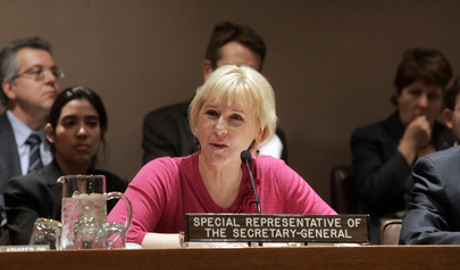
Margot Wallström spoke on the panel discussion ”Unite to stop the violence against women” in 2010
Some member states are concerned that certain language, if it is repeated year after year, could actually become binding law, and they are nervous about this prospect (the US would be a good example). Other countries are extremely hostile with regards to reproductive rights (Latin American countries, for example) and try to get any mention of such ”rights” out of the text.
Some countries are very hostile to LGBT rights and will refuse any language that mentions women’s sexuality or defines gender in ways they object to (some Caribbean nations). Some Muslim countries object to language against child marriage – not so much because they think child marriage is great, perhaps, but because they want to preserve their legislative sovereignty.
Some countries such as Russia and the US play to domestic political audiences, by looking conservative and traditional. European countries generally stand for a progressive line, but it’s not that straightforward. In UN commissions and committees, the EU has to speak with one voice, so all EU members on the delegation coordinate with each other before going into the session, and only the EU presidency will speak for them. Within the EU, some issues are also contentious, especially reproductive rights, so even language proposed by the EU is already a compromise.
The CSW does not review individual countries’ performances on women’s rights or women’s de facto status. It does not receive mandatory reporting by countries about how they do on those matters. It does not receive shadow reports from NGOs on how any one or several countries are doing (although advice and information from NGOs is integrated into the CSW’s work). It actually isn’t technically about ”rights”, since it is under ECOSOC and not the UN’s human rights bodies. Although the agreed conclusions will routinely mention rights, wherever committee members can agree on that.
The CSW, like all bodies under ECOSOC, is open to being advised and informed by civil society, a mechanism that has been part of the UN’s work since its early days, but which has taken on increased significance in the past 20-30 years. ECOSOC maintains a registry of thousands of NGOs from all over the world who can sign up to be at these gatherings, but in practice, even if you are not from one of those NGOs, you can always come to New York and try to engage with the process.
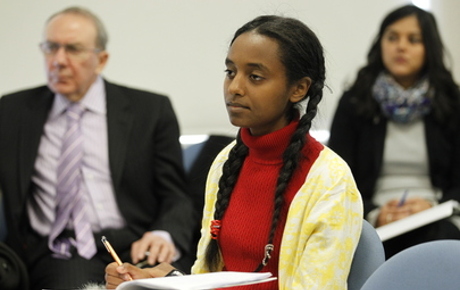
Side conference to CSW 2014: ”Women and Girls with Disabilities in Science and Technology”
The CSW is more famous than just about any other mechanism of the UN at this level because in 1995 it took place in Beijing, at a very high level, with massive civil society participation and unprecedented media attention. That’s where Hillary Clinton famously said ”women’s rights are human rights, and human rights are women’s rights”. The international Beijing platform for action was adopted then.
Unlike all other commissions and other bodies under ECOSOC, the CSW has over the years turned into a huge, thriving gathering for the global women’s movement, for NGOs from all over the world. This says a lot more about the nature of the global women’s movement than about the UN or the CSW member states, who are in bafflement over all these NGOs that routinely keep showing up. This year, close to 4000 NGO delegates were registered, but probably even more came. They have turned the CSW into a platform of their own, holding hundreds of panels, meetings and discussions – some of them with member states, but the majority just for themselves.
This is also why I attend the CSW almost every year. It is a wonderful opportunity to get to know activists from all over the world, learn and be inspired, support each other and build networks. A few NGOs attend the CSW with the specific goal of lobbying the member states and influencing the agreed conclusions, and they excel at this work. My impression is that member states do pay more attention and take it more seriously, since the CSW session has become such an unusual and huge event in the UN’s annual calendar. The CSW is also the UN’s only commission that gets its own media coverage when it takes place.
There are 45 members in the CSW. Like all other such bodies at the UN, there is a geographic distribution of seats on the Commission. They are elected by ECOSOC, which has a very similar make-up (54 members, distributed by region). De facto, each region gets to propose its own members, and within the regions, they typically agree to a rotation.
Some countries are more eager than others to be on the Commission, because they want to play an active role in all UN functions. Other countries don’t mind not serving on so many commissions, because they feel they have limited resources or other priorities at the UN. Some want to be on the CSW because they are especially motivated on work on women’s issues. But for the most part, it ends up being a rotation within each region.
It would be politically difficult for countries from one regional group (e.g. Western Europe) to veto the regional nominees from another regional group. This is diplomacy, after all. And Saudi Arabia is not a country with which even Western countries are ready to lose their good relations, certainly not over something as insignificant as a seat on an ECOSOC commission. Sooner or later, just by geographic circulation, Saudi Arabia would become a member of the CSW.
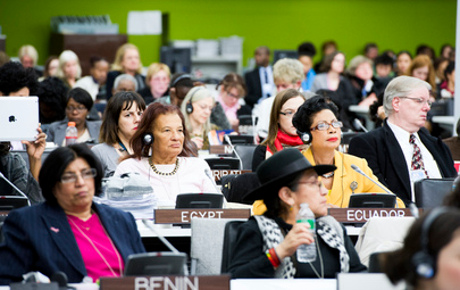
The conference ”Parliamentary strategies for tackling violence against women and girls” was one of many that were held parallell to the CSW 2013.
I thought it was a typical example of dishonest coverage of the UN, which is meant to make ”the UN” as an institution look bad. It started with an article by UN Watch. A lot of the media do sloppy reporting on the UN, which is usually due to ignorance about how the UN’s institutions are set up and work. But UN Watch knows the UN system very well, so this wasn’t out of ignorance. They know very well that ”the UN” didn’t vote Saudi Arabia into the Commission, and that the voting has its own processes. They also know very well that the CSW is not ”the UN’s women’s rights commission”, as they put it.
UN Watch was created by people and interests that could be called hostileto the UN as an institution or at least skeptical of multilateralism in general. Some of its work is dishonest in that it blames ”the UN” for failures that are entirely due to individual member states. This is a common tactic among those opposed to multilateral institutions.
UN Watch also has a record of being very supportive of Israel and actively opposed to any criticism of it, within the UN. This may have also influenced its decision to use this opportunity to make both Saudi Arabia and ”the UN” look bad. It’s very easy to take information, distort it a little bit and otherwise rely on the general public’s ignorance of how the UN works to create a mini-scandal.
I don’t blame the public. This is complicated, technical, specialized knowledge that people are not obliged to have. Realistically, it is improbable to think that we could educate the public more about how the UN works, so that they would take an interest and have informed discussions. Therefore, a special responsibility falls to journalists. But from what I have seen, even many reputable publications have just copied the press release by UN Watch, without questioning it or fact-checking it.
The CSW is a yearly struggle. There are commission member states that balk at all progress on gender equality, countries that want to take us back in time, and delete progressive language that was agreed upon many years ago. There are member states that play cynical games for political ends, being more conservative at the CSW than they are at home with their own populations – to amplify their credibility in the Muslim world or other developing countries and thus form alliances that might benefit them in unrelated foreign policy goals.
Some countries like to be spoilers and contrarians at the UN out of habit, and they do it across the board, in all committees and commissions. Saudi Arabia is hardly the only one of those or even the worst. I expect that they will gang up with other conservative countries, which sometimes form very interesting geographical alliances, to block certain language or introduce language reflecting their goals. But I don’t expect that Saudi Arabia’s presence on the Commission will make next year’s process harder than it already is, or the agreed conclusions weaker than they would already be. I expect that very little at the CSW will change because Saudi Arabia is now a member.
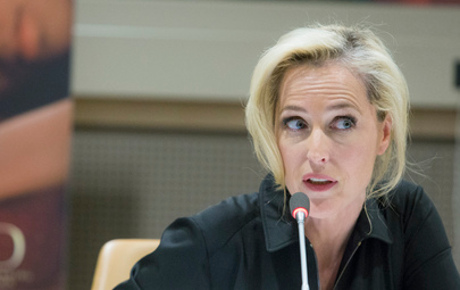
Actor Gillian Anderson in panel discussion 2016: ”Role of Arts in Helping End Human Trafficking”
The CSW is still a fantastic space created by women’s civil society, and I’d encourage any activist (in the widest sense – students, journalists, teachers et cetera) to go there and see it for themselves.
The large-scale, vibrant feminist space that has been created by the global women’s movement around the annual session of the Commission shows one thing, year after year: all around the world, women and girls and the activists who fight for gender equality are years ahead of anything a group of governments could come up with, sitting in a conference room for two weeks. Although in all the years I have been attending the CSW, I have only once heard a UN official acknowledge that fact.
Kommentarer
Du måste vara inloggad för att kunna lämna en kommentar.


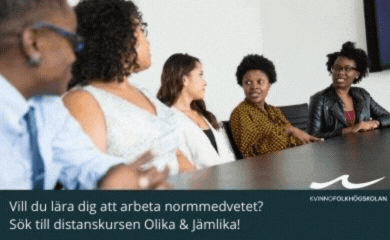




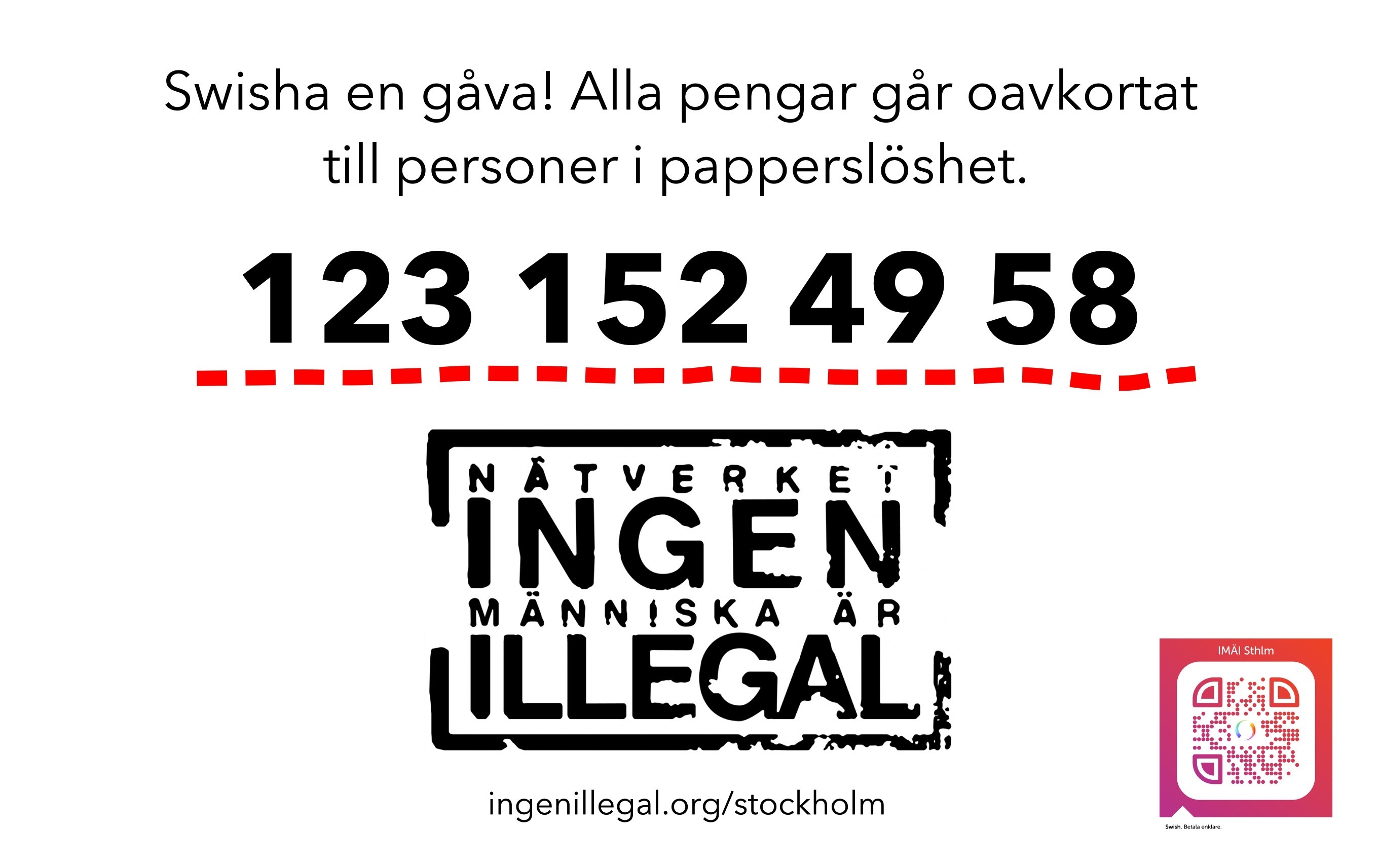



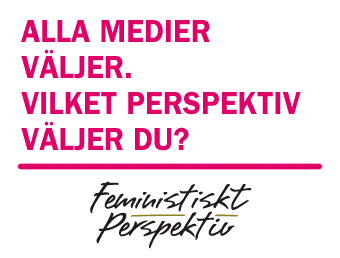












MEST KOMMENTERAT
SENASTE KOMMENTARERNA
Om Var Grupp 8 en feministisk organisation?
Om #bildskolan 21: Att äta Den Andre
Om #bildskolan 21: Att äta Den Andre
Om Porr handlar om betalda övergrepp
Om Nobels fredspris till kampanj för att avskaffa kärnvapen
Om Feministiskt perspektiv öppnar arkivet och startar på nytt!
Om Rödgrönt ointresse för fred och nedrustning borde oroa många
Om Var inte målet att vi skulle jobba mindre?
Om Feministiskt perspektiv öppnar arkivet och startar på nytt!
Om Feministiskt perspektiv öppnar arkivet och startar på nytt!
MEST LÄST